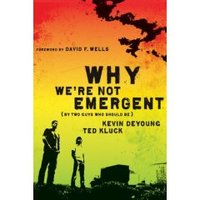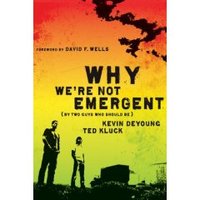
In the introduction of their new book whose title says it all – Why We’re Not Emergent: By Two Guys Who Should Be (Moody, 2008) – authors Kevin DeYoung and Ted Kluck offer yet another attempt at defining “emergent Christianity.” I’ve included the full quotation below. Check it out and tell me whether you fit the bill.
After reading nearly five thousand pages of emerging-church literature, I have no doubt that the emerging church, while loosely defined and far from uniform, can be described and critiqued as a diverse, but recognizable, movement. You might be an emergent Christian:
if you listen to U2, Moby, and Johnny Cash’s Hurt (sometimes in church), use sermon illustrations from The Sopranos, drink lattes in the afternoon and Guinness in the evenings, and always use a Mac; if your reading list consists primarily of Stanley Hauerwas, Henri Nouwen, N. T. Wright, Stan Grenz, Dallas Willard, Brennan Manning, Jim Wallis, Frederick Buechner, David Bosch, John Howard Yoder, Wendell Berry, Nancy Murphy, John Frank, Walter Winks, and Lesslie Newbigin (not to mention McLaren, Pagitt, Bell, etc.) and your sparring partners include D. A. Carson, John Calvin, Martyn Lloyd-Jones, and Wayne Grudem;…
if your idea of quintessential Christian discipleship is Mother Teresa, Martin Luther King Jr., Nelson Mandela, or Desmond Tutu; if you don’t like George W. Bush or institutions or big business or capitalism or Left Behind Christianity; if your political concerns are poverty, AIDS, imperialism, war-mongering, CEO salaries, consumerism, global warming, racism, and oppression and not so much abortion and gay marriage; if you are into bohemian, goth, rave, or indie; if you talk about the myth of redemptive violence and the myth of certainty; if you lie awake at night having nightmares about all the ways modernism has ruined your life; if you love the Bible as a beautiful, inspiring collection of works that lead us into the mystery of God but is not inerrant; if you search for truth but aren’t sure it can be found; if you’ve ever been to a church with prayer labyrinths, candles, Play-Doh, chalk-drawings, couches, or beanbags (your youth group doesn’t count); if you loathe words like linear, propositional, rational, machine, and hierarchy and use words like ancient-future, jazz, mosaic, matrix, missional, vintage, and dance; if you grew up in a very conservative Christian home that in retrospect seems legalistic, na?ve, and rigid; if you support women in all levels of ministry, prioritize urban over suburban, and like your theology narrative instead of systematic; if you disbelieve in any sacred-secular divide; if you want to be the church and not just go to church; if you long for a community that is relational, tribal, and primal like a river or a garden; if you believe who goes to hell is no one’s business and no one may be there anyway; if you believe salvation has a little to do with atoning for guilt and a lot to do with bringing the whole creation back into shalom with its Maker; if you believe following Jesus is not believing the right things but living the right way; if it really bugs you when people talk about going to heaven instead of heaven coming to us; if you disdain monological, didactic preaching; if you use the word “story” in all your propositions about postmodernism – if all or most of this torturously long sentence describes you, then you might be an emergent Christian.*
Now that you know the symptoms, take the quiz on the left and let me know if you consider yourself an emerging Christian.
(*Reprinted with the permission of Moody Publishers)









